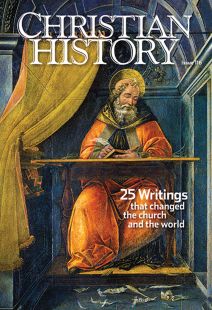Solid, scriptural, rational
JOHN WESLEY [#22] wrote of the Book of Common Prayer (BCP), “I believe there is no Liturgy in the world … which breathes more of a solid, scriptural, rational piety than the Common Prayer of the Church of England.” Modern mystery writer P. D. James noted its influences on everyone from John Bunyan [#6] to “the majestic phrases of John Milton” to Defoe, Thackeray, the Brontës, Coleridge, Eliot, and Sayers. Phrases like “till death do us part” and “ashes to ashes, dust to dust” have entered common speech. Eighty million Anglicans still use the book in worship worldwide. Not a bad achievement for a liturgy originally written by a committee.
Order Christian History #116: Twenty-Five Writings that Changed the Church and the World in print.
Subscribe now to get future print issues in your mailbox (donation requested but not required).
One book for one kingdom
When Henry VIII broke with Rome, he made no changes in the Latin liturgies used in worship. But when his nine-year-old son Edward VI came to the throne in 1547, reform-minded church leaders seized the opportunity to standardize, coordinate, and translate an entire book of prayer into English.
One such reformer was Thomas Cranmer, who all agree had the largest hand in the book’s composition. He rose from a modest middle-class family to become a priest and a Cambridge don, and came to Henry VIII’s attention in the late 1520s while applying legal assistance to Henry’s attempted annulment of his marriage to Catherine of Aragon. Having already gone against Catholic regulations by marrying the niece of leading reformer Osiander, Cranmer was soon appointed as archbishop of Canterbury through the maneuvers of Anne Boleyn, Henry’s mistress and future wife.
At the time the BCP was published, the most commonly used rite was the “Sarum rite” from Salisbury. But others floated around the kingdom; no fewer than four different books might be needed for any service. Furthermore, the reformers complained, the plain reading of Scripture was interfered with by “uncertain stories, Legends, Responses, Verses, vain repetitions, Commemorations” that cluttered up the order of worship and the yearly calendar. All of this would be changed, they hoped, by a clear and accessible English book.
We know very little about the writing of the book; church records perished in the Great Fire of London in 1666. The First Act of Uniformity in 1549 referred to a group of “learned men of this realm,” led by Cranmer, compiling “one convenient . . . fashion of common and open prayer and administration of the sacraments.” They seem to have met at least twice in 1548 to do their work. The requirement that the book be used from June 1549 onward triggered riots by people sympathetic to the Catholic liturgy, claiming the new one was “like a Christmas game.” The only surviving sermon by Cranmer denounces this rebellion against his new book.
When Edward’s Roman Catholic half sister Mary I, daughter of Catherine of Aragon, came to the throne, Cranmer was executed for supporting a rebellion against her—as well as for his continued use of the BCP, which he called “more pure and according to God’s word, than any that hath been used in England these thousand years.” His dramatic execution formed one of the centerpieces of John Foxe’s Book of Martyrs (see p. 32), but his book survived kings, queens, and numerous revisions to remain the living worship language of millions. CH
This article is from Christian History magazine #116 Twenty-Five Writings that Changed the Church and the World. Read it in context here!
By Jennifer Woodruff Tait
[Christian History originally published this article in Christian History Issue #116 in 2015]
Jennifer Woodruff Tait is managing editor of Christian History.Next articles
Not concerning the heart but the life
Jonathan Edwards’s Treatise [#23] and John Wesley’s Plain Account [#22] spoke of holiness
William Kostlevy




